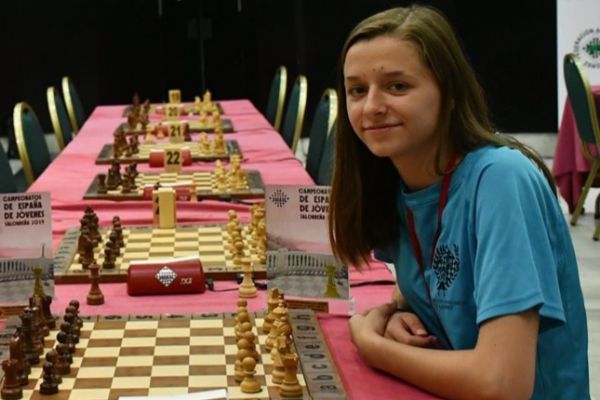- Deviated column. Why are women worse than chess? Are they less intelligent?
«There are no more chess champions for a numerical issue. We could talk about physical resistance, maybe a boy can take a four-hour game more easily, finish cooler, but that can be trained. Actually, if there are no more champions it is because we are few. I guess it's a social, cultural issue, maybe girls are less encouraged to start, I don't know. If in a mixed tournament only a small percentage of the participants are girls, how are we going to win every year?
María Eizaguerri , only 14 years old, answers the great question: Why is it the first?
A few weeks ago she won the Spanish U-16 fast chess championship with eight points in nine games and became a pioneer: never before in the country, in any category, a woman had beaten men. He did it to players like Pedro Ginés , international master and U-14 world champion in 2018. He did it almost without realizing it, as he admits, until the last round he did not look at the classification. Since 2002, the Spanish Federation jointly organizes tournaments by age, but even Eizaguerri had always imposed boys and, moreover, on very rare occasions there were girls in the top 10.
Again his victory opened the old debate: Why are women worse in chess?
Josep Oms , coach of the young champion and Grand Master, also addresses the question: «As María says, the number is key: if there are 5% of participants, which is normal [in Spain there are 7% of federated], It's hard for them to win. The intellectual capacity is the same, that is clear. Then there are many theories: there are those who say that the tournament environment, with a majority of men, conditions women ... For me, in training categories, there are differences. The girls mature before and at age 12 or 13 they already have other interests, other distractions, maybe they leave it, while the boys take longer to reach that ».
In his response the technician provides two interesting observations. The first: women play with a backpack. A couple of years ago, a study by the professor at the University of Barcelona María Cubel showed that if a woman does not know who she faces, that is, she plays blindly, she has more chance of winning than if she knows that she is measured man. It is the theory of stereotype threat: when a group suffers a stereotype, the anxiety to avoid it increases the options to confirm it.
And the second contribution of Oms: women leave before. As in other disciplines, the dropout rate is higher in the female category, perhaps for an early maturity, as the coach points out, or perhaps for other reasons. The Spanish Athletics Federation, for example, has been studying why many girls slow down in adolescence, at 16 or 17 years old, and among the factors analyzed, in addition to physical change, there is a greater social pressure to focus on the studies.
With its history, Eizaguerri herself confirms that point: «At the end of 2018 and beginning of 2019 I was about to leave it. I had no coach, I was a little tired, I was going to go to high school soon, I don't know. Also here in Huesca, where I live, there are fewer tournaments, the trips are long ... But hey, Josep appeared, I started working with him and decided to continue. Now I am quite animated. I will continue in chess as long as I can. I think it can be combined with studies, but I will see.
Eizaguerri began to play by chance: when he was five years old, a neighbor of his town, Cuarte, of only 90 inhabitants, taught him the rules and he liked it so much that he asked for a book a few days later. "It was from Karpov or Kasparov, but I don't remember exactly which of the two," he admits. At the age of seven, in 2012, she was already champion of Spain U-8 in the women's category and fourth in the Women's European in Prague, the following year she went to the Women's World Cup in Dubai and so on until now: this week, until Sunday, dispute the female European of Bratislava. Unlike the championships in Spain, which are mixed and then divided into categories, international tournaments are held directly separately, a controversial policy.
Eizaguerri coach Josep Oms sums it up well: «For me it is a mistake. I know there are controversies because in the mixed championships there can also be traps, guys who let themselves be lost to favor a partner, things like that. But the best have to play with the best. When we prepare a game with Maria, we don't see if she faces a man or a woman. She wants to compete, wants to win, and in my opinion for that it is best to try with everyone ».
According to the criteria of The Trust Project
Know more- Chess

